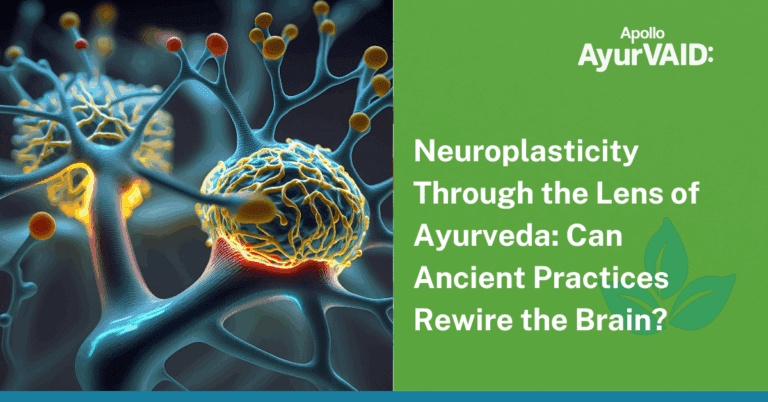Joint pain, especially knee joint pain, poses significant challenges, particularly in the elderly population – individuals aged 65 and above. This is often a result of degeneration commonly known as wear and tear as age advances.
Ayurveda provides a systematic clinical approach to address knee pain by considering individual constitution and pathology. Ayurvedic treatment for knee pain perceives knee pain as a result of aggravated Vata dosha, resulting in degeneration, inflammation, and reduced lubrication in the knee joints. The clinical approach involves a detailed evaluation of the patient’s constitution, physical examination of the affected joint, and underlying pathology to design a personalised treatment plan.

Causes of Knee Joint Pain in Ayurveda
Knee joint pain can have various causes, in the elderly the most common concern is Osteoarthritis (OA) arising from degenerative changes involving the wear and tear of cartilage and joint structures, leading to the natural breakdown of joint tissues over time. Past joint injuries, excessive strain, or improper use further contribute to the development of OA. Other causes include:
- Inflammatory Arthritis (e.g., RA): Autoimmune inflammation.
- Post-Traumatic Arthritis: From past injuries or trauma.
- Gout: Uric acid crystals causing inflammation.
- Infection: Bacterial, viral, or fungal joint infection.
- Bursitis: Inflammation of fluid-filled sacs around the knee.
- Tendonitis: Inflammation of knee tendons.
- Ligament Injuries: Tears causing instability.
- Meniscus Tears: Damage from twisting or sudden movements.
- Bone Tumors or Lesions: Abnormal growths affecting the knee.
External Factors:
- Overexertion or Repetitive Strain: High-stress activities.
- Improper Footwear: Lack of proper support.
- Obesity: Excess weight straining knee joints.
- Poor Posture or Mechanics: Incorrect body alignment.
- Metabolic Disorders: Impact on joint health.
- Neurological Conditions: Affecting pain perception.
- Vascular Issues: Circulation impacting joint health.

Clinical Interventions for Knee Pain in the Elderly
Surgical interventions for osteoarthritis (OA) in the elderly include Total Knee Replacement (TKR), typically reserved for severe cases where significant joint damage occurs, necessitating the replacement of the damaged knee joint with an artificial one. Arthroscopy, involving the insertion of a small camera and instruments into the joint, is used both for diagnosis and potential treatment, however, certain contraindications exist for these surgeries, including considerations related to poor overall health, heightened surgery risks, and cases where OA symptoms persist despite conservative treatments, which might not warrant surgical intervention. While advanced age alone might not rule out surgery, overall health status and life expectancy play crucial roles in decision-making.
Ayurveda Clinical Intervnetions
Ayurveda’s approach to preventing the need for Total Knee Replacement (TKR) involves a multifaceted protocol. After a comprehensive assessment of the patient’s constitution and presenting complaints, Ayurveda doctors plan a therapeutic approach, that involves pacifying Vata dosha or addressing associated factors. Ayurveda treatments focusing on preventing the need for TKR surgery include Integrative rehabilitation integrates physical therapy involving exercises, manual techniques, and educational components to enhance joint functionality and diminish pain, in addition to medical management, Panchakarma, diet and lifestyle modifications based on individual constitution.
Personalized Treatment for Elderly Patients at Apollo AyurVAID
In older adults, factors like weakened musculoskeletal strength and age-related degenerative changes require careful evaluation. The treatment plan is customized considering these aspects. Adjustments in medication dosage, administration methods, and therapeutic procedures are made to ensure safety and efficacy in older individuals.
Besides addressing knee pain directly, emphasis is placed on dietary modifications, lifestyle adjustments, and gentle exercises customized to the individual’s capacity to maintain joint health and mobility. Ayurveda’s clinical approach to knee pain management in the elderly revolves around a personalized treatment paradigm that targets the root cause by rebalancing aggravated doshas and addressing joint pathology. Through a combination of herbal formulations, external therapies, internal medications, and, if necessary, Panchakarma interventions, Ayurveda offers a comprehensive strategy to alleviate knee pain and improve the quality of life for older individuals.
At Apollo AyurVAID, our whole-person approach stands as a promising avenue for managing knee pain and enhancing overall well-being in the aging population. For optimal outcomes, consultation with a qualified Ayurveda doctor is crucial. This ensures a precise diagnosis, personalized treatment plan, and safe implementation of Ayurveda interventions, especially for severe knee pain in the elderly.






